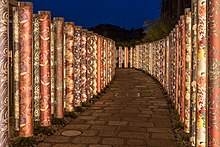Arashiyama Station (Keifuku)
Arashiyama Station
| |
|---|---|
 Station entrance and surrounding shops 2011 | |
| General information | |
| Location | Ukyo-ku, Kyoto Kyoto Prefecture Japan |
| Coordinates | 35°00′55″N 135°40′40″E / 35.015214°N 135.677694°E[1] |
| Operated by | Keifuku Electric Railroad |
| Line(s) | Randen Arashiyama Line |
| Distance | 7.2km from Shijō-Ōmiya |
| Platforms | 4 |
| Tracks | 3 |
| Connections | Hankyu Arashiyama Line (HK-98: Arashiyama) JR West Sagano Sanin Main Line (Saga Arashiyama E07) Sagano Scenic Railway (Torokko Saga) |
| Construction | |
| Structure type | At-grade |
| Other information | |
| Station code | A13 |
| Website | Official (in Japanese) |
| History | |
| Opened | March 25, 1910 |
| Passengers | |
| FY2015[2] | 1.4 million |
Arashiyama Station (嵐山駅, Arashiyama-eki) is a tram stop in Ukyo-ku, Kyoto, Japan,[3] and the western terminus of the Randen Arashiyama Line that begins at Shijō-Ōmiya. The station includes a small shopping arcade, outdoor eating areas, a foot bath, a garden featuring cherry and maple trees, as well as the "Kimono Forest," a collection of 600 kimono gowns wrapped around poles with LED lighting inside[4][5] developed by the interior designer Yasumichi Morita.
History
[edit]
Arashiyama station opened on March 25, 1910, as the terminal station for the Arashiyama Railway connecting Arashiyama with Shijō-Ōmiya. The station was reconstructed in 1929 to accommodate the now-defunct Atagosan Railway.[6] This line started at Arashiyama and headed westward towards Kiyotaki via the Kiyotaki Tunnel, where passengers would transfer to a narrow-gauge funicular to proceed their journey to the top of Mt. Atago.[6] In 1944 the Atagosan Railway was abandoned, just two years after the Keifuku Electric Railroad seized operation of the Arashiyama Line.
In 2002 the "Arashiyama Hannari Hokkori Square" plaza was built, with the addition of the iconic foot bath in 2004. The station was completely renovated in 2007 and 2013.

Station layout
[edit]The station consists of three platforms at ground level, with a wheelchair-accessible concourse and ticket barriers. All platforms service trams bound for Shijō-Ōmiya.[7] Tracks 1 and 2 are primarily used.
| Track | Line | Destination |
|---|---|---|
| 1 | Arashiyama Line | Shijo-Omiya via Katabiranotsuji |
| 2 | Arashiyama Line | Shijo-Omiya via Katabiranotsuji |
| 3 | Arashiyama Line | Shijo-Omiya via Katabiranotsuji
Special services to Kitano-Hakubaicho |
Adjacent stations
[edit]| « | Service | » | ||
|---|---|---|---|---|
| Randen Arashiyama Line | ||||
| Randen-Saga (A11) | Local | Terminus | ||
Surrounding area
[edit]- Tenryū-ji Temple
- Nonomiya Shrine
- Arashiyama Bamboo Grove
- Kogenji Temple
- Kyoto Arashiyama Orgel Museum
- Hogonin Temple
- Iwatayama Monkey Park
- Okochi Sanzo Villa
- Saga-Torimoto
- Hozu River
- Togetsukyo Bridge
- Hankyu Arashiyama Station
- JR West Saga-Arashiyama Station
- Sagano Scenic Railway Torokko Saga Station
References
[edit]- ^ "Way: Arashiyama (279279195)". OpenStreetMap. Retrieved 2010-10-11.
- ^ 第8章 都市施設 [Chapter 8: Urban facilities]. 京都市統計書 [Statistics of Kyoto City] (in Japanese). City of Kyoto. 2017.
- ^ 嵐山 (in Japanese). Keifuku Electric Railroad Co., Ltd. (Randen). Retrieved 2010-10-11.
- ^ "京福電鉄 「嵐山駅」│京都に住もう". www.elitz.co.jp. Retrieved 2019-02-05.
- ^ "Keifuku Line (Randen)". Discover Kyoto. Retrieved 2010-10-11.
- ^ a b "幻の鉄道「愛宕山鉄道」を訪ねて". www.geocities.jp. Archived from the original on 2018-12-27. Retrieved 2019-02-05.
- ^ "Station Map". Arukumachi KYOTO Route Planner. Retrieved 2010-10-11.
External links
[edit] Media related to Arashiyama Station (Randen) at Wikimedia Commons
Media related to Arashiyama Station (Randen) at Wikimedia Commons- Keifuku Electric Railroad Randen official summary page (English)
